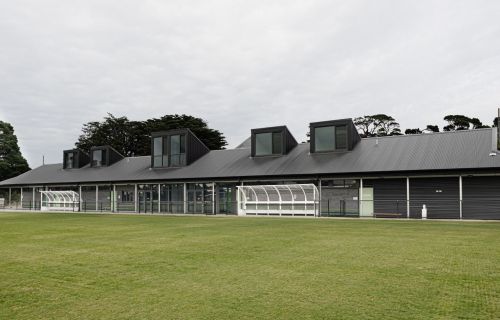View the social story for the upgrade to the Victoria Park Inclusive Play Space (view the text only version)
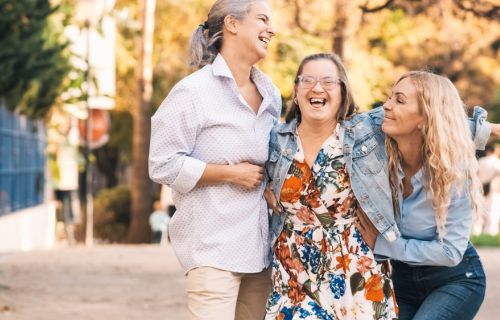
Sensory Friendly Stay and Play Zone
Dedicated Assistance Dog Relief Area
City of Ballarat has installed a guide and assistance dog toileting area in central Ballarat. Increasing awareness about the needs of people with guide and assistance dogs is also a key feature of this project.
The City of Ballarat is proud to partner with Regional Development Victoria, through support from the Living Local Fund, for this project.
Disability Access and Inclusion Plan
The City of Ballarat plays an important role in ensuring that everyone who lives in the municipality can participate in all aspects of community life and to fulfil their own aspirations. The City of Ballarat also has responsibility for both local government service delivery and as an employer.
Read the Disability Access and Inclusion Plan
Read the Disability Access and Inclusion Plan Easy-Read Summary
Disability Advisory Committee
The City of Ballarat Disability Advisory Committee provides advice and support to us about how we can create a more accessible and inclusive city. The Committee also supports the development, implementation and evaluation of the Disability Access and Inclusion Plan.
In addition to Cr Damon Saunders who is the appointed Councillor and Chair for the Committee, membership comprises of 12 community members who reflect a breadth of access and inclusion perspectives of people with a disability, their families and carers.
During 2023, the Disability Advisory Committee was nominated for a National Disability Award for Excellence in Regional and Remote Support. They also supported two community projects – the Sensory Friendly Stay and Play Zone and the Accessibility, Arts and Assistance Dogs in the Ballarat CBD Project.
General Accessibility Information
Do you need an accessible parking permit?
Visit our Accessible Parking Permits page
Do you need toilet facilities?
Visit the National Public Toilet Map
Changing Places (CP) and/ or Adult Changing Facilities (ACF) are available:
- At the back of the Ballarat Town Hall (Bath Lane – ACF)
- At North Gardens beside the Botanical Gardens (Zoo Drive Lake Wendouree – CP)
- At the Victoria Park Inclusive Play Space (Off Russell or Gillies St South Newington – CP)
- At Selkirk Stadium (989 Norman St Wendouree – CP)
- Ballarat Aquatic and Lifestyle Centre (off Gillies St Wendouree – ACF)
- Stockland Wendouree Shopping Centre (Gillies St Wendouree – CP)
- Mars Stadium (725 Creswick Rd Wendouree – CP for events only)
Please note that most are not available at night-time or outside of business hours.
Sensory Gardens
The Ballarat Botanical Gardens features Sensory Gardens.
Read the Sensory Gardens Plant Species Guide
Page topics
Victoria's Accessible Parking Permit (APP) Scheme is an online system administered by VicRoads. Residents and organisations who need a new permit, or to renew or replace a permit, will need to apply online below.
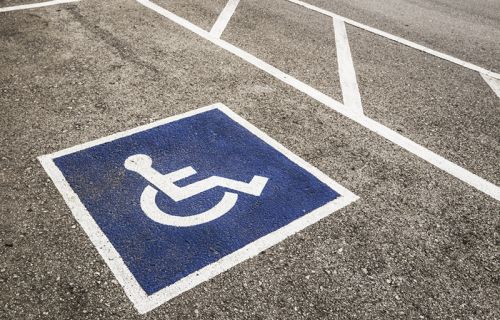
Apply for an accessible parking permit
How do I apply for or renew a personal accessibility parking permit?
- Start your application online at accessibleparking.vic.gov.au
- You’ll receive an application reference number via SMS*
- Take your reference number to your GP or occupational therapist
- Your GP or occupational therapist will complete an online assessment and submit your application.
- Your application will be assessed by VicRoads to determine if you qualify for a permit.
- If your application is successful, City of Ballarat will finalise your application and you’ll receive your permit in the mail.
* If you need help with the online form, please contact our Customer Service team on 5320 5500 and they can help you out with different options.
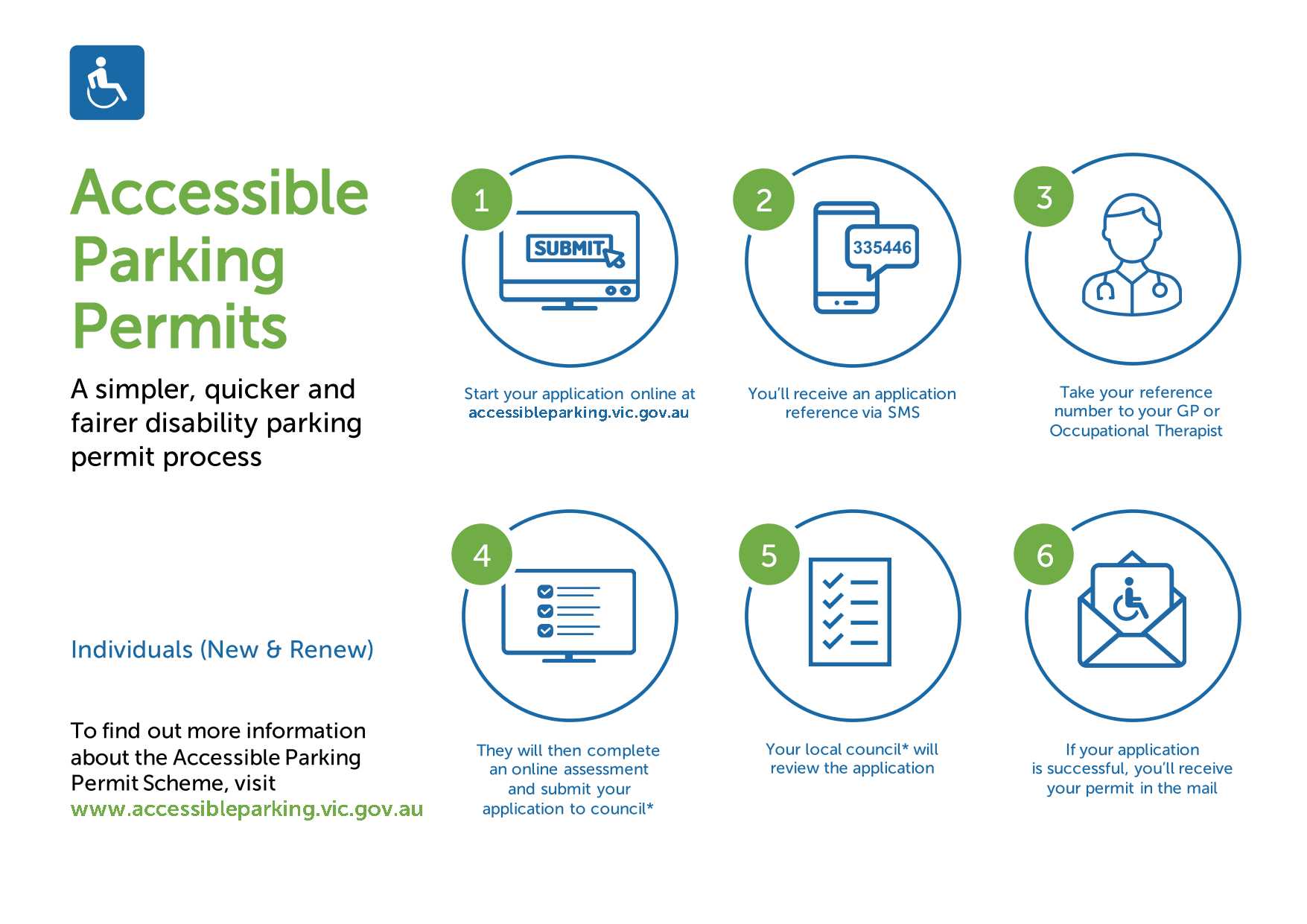
How do I apply for or renew an organisation accessibility parking permit?
- Start your application online at accessibleparking.vic.gov.au
- You’ll receive an application reference number via SMS and email
- Your application will be assessed by VicRoads to determine if you qualify for a permit.
- If your application is successful, City of Ballarat will finalise your application and you’ll pick up your permit at the council.
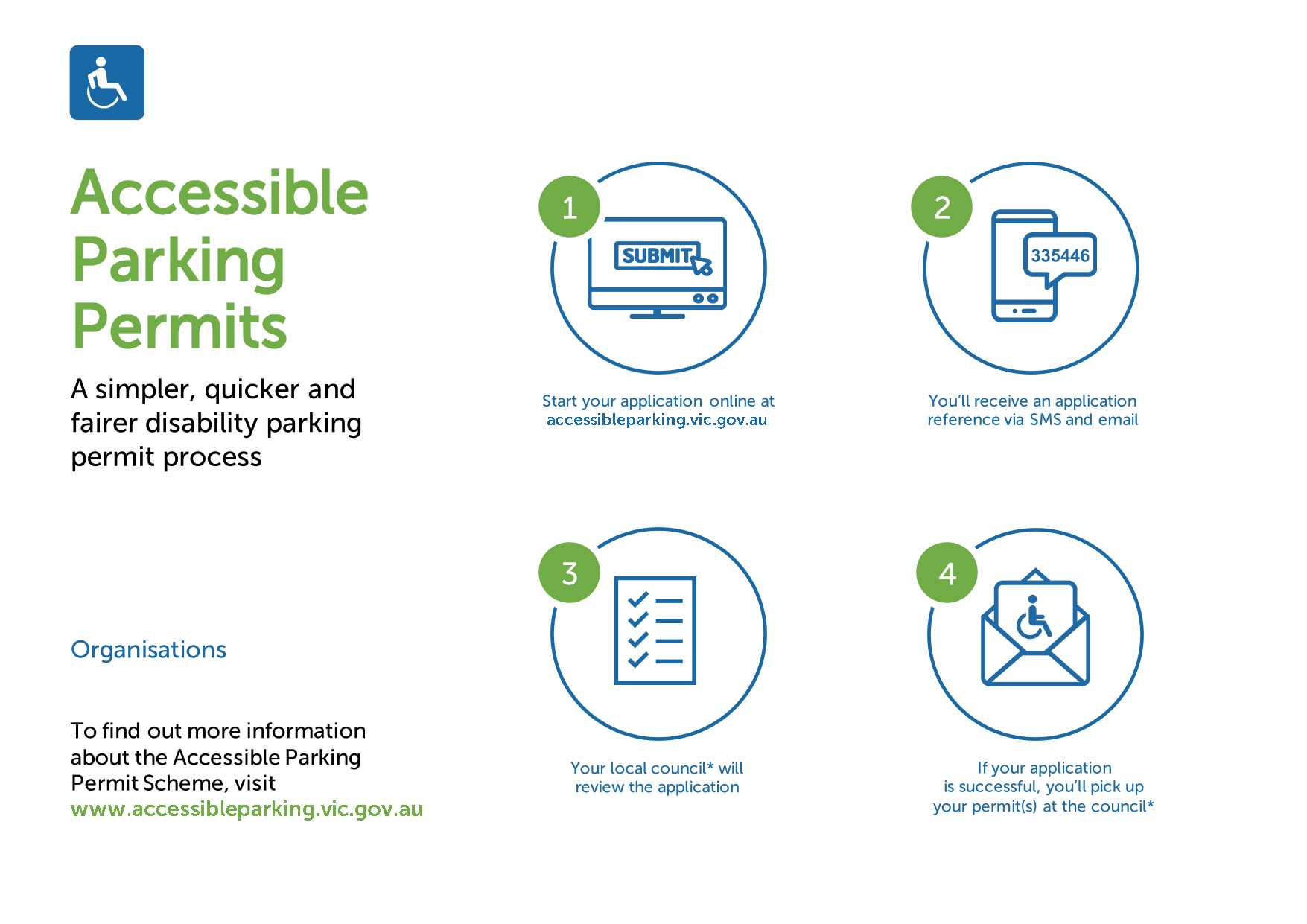
How do I replace my permit?
- Start your replacement application online at accessibleparking.vic.gov.au
- You’ll receive a replacement application reference number via SMS and email
- Your application will be assessed by VicRoads to determine if you qualify for a permit.
- If your application is successful, City of Ballarat will finalise your application and you’ll pick up your permit at the council.
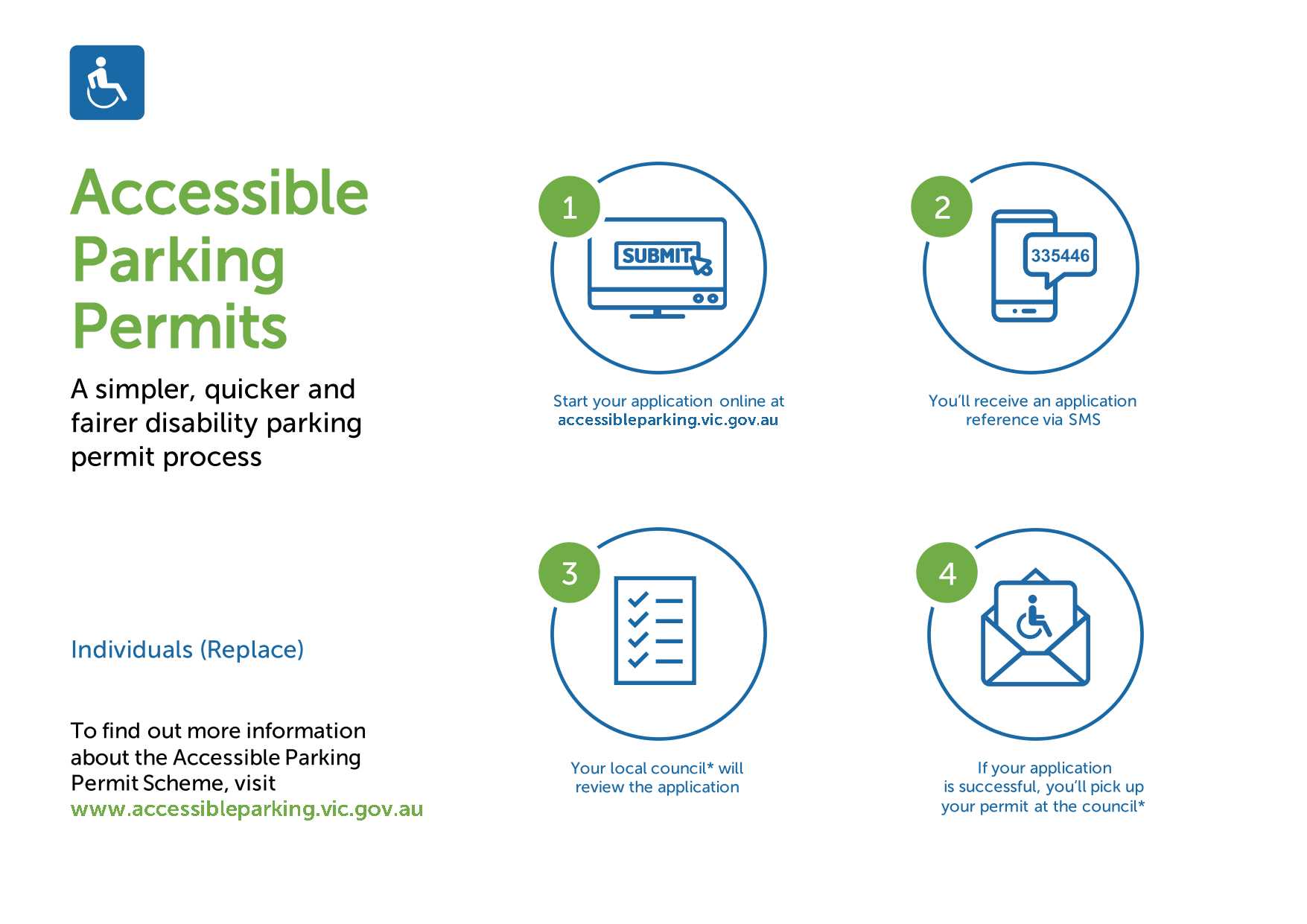
About the accessible parking permit scheme
In 2021, all Victorian councils will move to the new online system, which will provide community members with an easier, streamlined online application process, that is consistent across the state. The new permit also will better align with the COAG 2010 Australian Disability Parking Permit Scheme (ADPS).
Improvements to the Scheme include:
- Introduction of temporary permits for 6, 12 or 24 months,
- Increased permit length, from 3 to 5 years for individuals,
- Introduction of a permanent disability classification, so reassessments are not required for some people’s future permit renewals,
- A new single and secure state-wide permit design that will reduce the misuse of permits,
- The inclusion of occupational therapists (OTs) as assessors, in addition to GPs, and
- Double Time (green permits) and permits for organisations will continue under the new scheme.
Need some help?
Check out our FAQ section below to see if we have an answer to your question.
If you still need help with your application, or have questions on the new APP Scheme, contact our Customer Service team on 5320 5500.
FAQs
The application process
How do I apply for a disability permit?
- Start your application online at accessibleparking.vic.gov.au
- You’ll receive an application reference number via SMS
- Take your reference number to your GP or occupational therapist
- Your GP or occupational therapist will complete an online assessment and submit your application.
- Your application will be assessed by VicRoads to determine if you qualify for a permit.
- If your application is successful, City of Ballarat will finalise your application and you’ll receive your permit in the mail.
If your application is unsuccessful you'll receive a letter explaining why your application was declined.
Can I use a paper form instead?
If you need help with the online form, please contact our Customer Service team on 5320 5500 and they can help you out with different options.
Can I pick up my permit from City of Ballarat?
Yes. When completing your application, you can choose to pick up your permit from our Customer Service centre at The Phoenix, 25 Armstrong Street South.
How long does it take to get a permit?
Once your application is approved, your permit with arrive in the mail in around seven to 10 days.
These times may vary depending on Australia Post demand.
What if I don't have internet access or physically can't complete the online application?
Your carer, a family member, friend, GP, or our Customer Service team can help if you need assistance or have no internet access.
Can I or my GP use old application forms to apply for a permit?
No. As part of the disability parking scheme update, clearer assessment questions were created with the help of medical professionals, to allo GPs and occupational therapists to assess mobility issues against the criteria. Some questions on old forms are no longer valid and do not fit the new schemes questions.
Dispute resolution
I didn't get a permit because I didn't meet the eligibility criteria
If you believe your GP or occupational therapist has incorrectly assessed your mobility issue or medical condition, you may seek a second opinion from a different GP or occupational therapist. This is done by starting a new application, with the functional assessment undertaken by a different medical practitioner.
I received a Double Time Permit when I wanted an Australian Disability Parking Permit
Permit type is determined by criteria assessment and not someone’s personal preference or request. An applicant’s mobility issue is the sole determent of permit type. It is important to remember that there is a hierarchy of needs within disability parking. People who require extra space to get out of a vehicle or whose medical condition restricts walking to less than 100m are given priority.
If you believe your GP or occupational therapist has incorrectly assessed your mobility issue or medical condition you may seek a second opinion from a different GP or occupational therapist. This is done by starting a new application with the functional assessment undertaken by a different medical practitioner.
How do I dispute my disability parking permit outcome?
If you wish to dispute the eligibility criteria of the scheme or scheme operation you can request an explanation of the basis of the eligibility of the criteria and scheme operation from VicRoads. You can contact VicRoads at acesssibleparking@roads.vic.gov.au, or phone 1300 965 677.
Scheme changes
Why was the scheme changed?
The Disability Parking Permit (DPP) Scheme in Victoria was last updated in 1995 and does not align with the national Australian Disability Parking Scheme.
The scheme was previously administered individually by each of the 79 councils in Victoria. Each council interpreted the scheme differently and had individual administration processes. That led to confusion within the community as well as the potential for inequitable outcomes for applicants and opportunity for the misuse of permits.
The updated scheme continues to be administered by the 79 Victorian councils, but the process for applying for and renewing permits has been streamlined.
The new APP Online Service provides community members with an easier application process and misuse of permits will be reduced, freeing up disability parking bays for the people who really need them.
What are the main differences with the new Scheme?
The Accessible Parking Permit (APP) project aims to streamline the permit application and renewal processes, clarify eligibility requirements, and introduce systems and tools to improve management of permits across Victoria.
Changes being made include:
- Permit holders who have been medically assessed as having an agreed permanent disability will no longer have to return to their medical practitioner for reassessment as part of the permit renewal process
- The permit duration will be increased from three years to five years for individuals (with non-temporary permits)
- The permit application and renewal processes will be streamlined with applications to be submitted through a new state-wide digitised system
- Permits will adhere to a standard, highly secure permit design rather than 79 variations which currently exist
- The name of the scheme will be changed from ‘Disabled Persons Parking Scheme’ to ‘Accessible Parking Permit Scheme’
The following features will be retained:
- Green Permits/Category 2 Permits will continue to allow a permit holder to park for twice the permissible time in an ordinary parking bay
- Those with significant intellectual disabilities are eligible for a permit.
Has the eligibility criteria changed?
The overall eligibility criteria has not changed. However, the wording and the process that a medical practitioner assesses a patient’s mobility or medical condition has changed.
Do I need to apply for a new permit?
You will need to apply for a new permit when your permit expires.
Can I keep using my existing permit?
Existing permits can be used until their expiry date.
Transitioning to the new scheme
I was previously told I don't need to see a GP - why do I need to see one now?
Permit applications were managed by 79 councils and this led to a range of variations in application processes and outcomes, including variations in process for people with permanent disabilities.
The APP Scheme has updated the questions GPs and Occupation Therapists will use to asses eligibility against the scheme. Every applicant for a permit will need to be assessed at least once by a GP or OT using the new application process and criteria questions.
GPs and OTs will have the ability in this new assessment process to categorise someone as having a permanent disability. This will mean they will no longer require a functional assessment to renew their permit.
I was previously eligible for a permit, but was not after applying for a renewal. Why?
As part of disability parking scheme update, clearer assessment questions were developed in consultation with medical practitioners to allow GPs and Occupation Therapists to assess mobility issues against the criteria. This related to both space requirements to exit and enter vehicles and the impacts of walking distances may have on an applicant’s health. Previously questions were open to a broad interpretation. They are now more aligned with assessing against the scheme criteria.
I used to have a blue permit, now it's green. Why is this?
The allocation of Reserved Bay (blue) and Double Time (green) permits is determined by outcomes of a mobility assessment.
As part of the disability parking scheme update, clearer assessment questions were developed in consultation with medical practitioners to allow GPs and occupation therapists to assess mobility issues against the criteria. This related to both space requirements to exit and enter vehicles and the impacts of walking distances may have on an applicant’s health.
Based on this, the outcome of your application may result in you receiving a green Double Time permit, rather than an Australian Disability Parking Permit (formerly known as the ‘blue permit’).
I am the parent of a disabled child, why can't my partner and I have a permit for each car?
The conditions of use for an accessible parking permit only allow for an individual to hold one permit. Permits are assigned to individuals, not vehicles. This was also a condition of the old scheme.
It is recognised that this will create inconvenience and difficulties for some people who share responsibility for caring for someone with mobility issues.
However, this needed to be weighed against the potential for permit misuse that can occur if an individual can be issued with multiple permits.
Why can't I get a permit on the spot anymore?
Permit administration, printing and distribution is now managed through one central process, which does not require a visit to your local council to process a form. Once your medical practitioner has undertaken your functional assessment it should take 10 to 15 days for your application results to arrive in the mail.
Why does my GP or OT not know the results of my application?
Your GP or occupation therapist will answer a range of questions that assess eligibility for a permit against the criteria. The answers to these questions determine your eligibility.
Prior to the assessment outcome being known, your local council will check your application against any know duplicate permits or previous cancelled permits. It is only after this assessment step is the outcome of your application determined and you are advised by mail.
Why can't my GP or OT decide if I get a green or blue permit?
Permit type has always been determined by functional assessment against set criteria questions and not personal preference or request. GPs and OTs are required to answer criteria eligibility questions, the responses to which determine permit eligibility and permit type.
Page topics
With an eye to the future, members of the City of Ballarat Disability Advisory Committee (DAC) are reflecting on their successes and challenges in making Ballarat a more inclusive and accessible place for all.
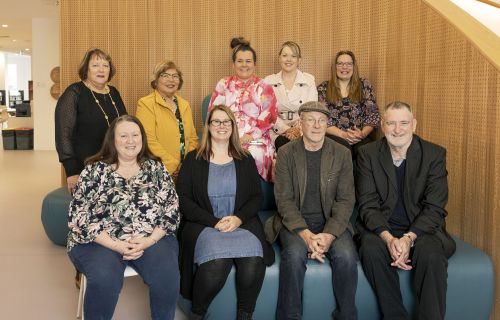
Disability Advisory Committee (DAC) member Christine Segaert firmly believes that working towards making Ballarat a more accessible place for people with disabilities has benefits for the whole community.
“If we make everything accessible from the beginning, then everyone can use it, and we can accommodate other groups such as our aging population,” she says.
“Whereas, if we don’t make our infrastructure and spaces accessible, we eliminate people.”
Learning from lived experience
Christine joined the DAC about four years ago after she acquired a disability and began using a wheelchair, soon learning that many places across Ballarat did not accommodate wheelchair access.
“These experiences prompted me to apply for the DAC, to improve accessibility in Ballarat,” she says.
Over her four years with the DAC, providing accessibility advice on City of Ballarat infrastructure projects has been one of Christine’s favourite elements of her role. In recent times, the DAC has provided feedback on the designs for the redeveloped Ballarat Library in Doveton Street and on the Bridge Mall design.
“I really believe if we can get it right at the beginning, it’s better for everyone,” she says.
“It’s much cheaper to get it right first than having to retrofit a space to make it accessible later.”
Christine is also a strong advocate for infrastructure specifically for people with assistance dogs. She is most proud of the Assistance Dog Relief Station, located near Target in Doveton Street South, which was opened to the public last year.
“Many people with assistance dogs have told me it’s a relief that they have the station there because it’s one place they can go that they know they’re not going to be interrupting anyone,” she says.
Sharing learnings
The DAC is comprised of a diverse array of members, not all of whom live with a disability themselves.
Rebecca Paton has been sharing her learnings with the DAC and broader community for more than a decade from navigating life with her daughter, who has a disability.
"I learnt a lot through the process of my daughter starting school and accessing services, so I had a lot of knowledge to share,” she says.
One of Rebecca’s main areas of interest over her years with the DAC has been to advocate for the installation of Changing Places toilet facilities across Ballarat. Changing Places provide suitable facilities for people who are not accommodated by standard accessible toilets.
“In 2012, I did some research about Changing Places toilets and found there was one in a park in Sydney,” she says.
“We visited the play space, which turned out to be an inclusive play space, and that was the beginning of the Inclusive Play Space that we now have in Victoria Park.”
Embedding accessibility
Both Christine and Rebecca say that a large piece of work for the DAC over the years has been educating the City of Ballarat, and other local organisations and businesses, to factor accessibility into considerations for all projects.
“It’s been really good to see different council departments learn to be proactive in terms of including us early in their processes,” Rebecca says.
“Accessibility isn’t an afterthought – it feels like we are making a positive difference.”
Watch the video featuring DAC member Christine Segaert.
Group photo: BACK Jenene Burke, Vivian Bradbury, Heidi Biggin, Narelle Mason, Robyn Hall. FRONT Christine Segaert, Rebecca Paton, Vincent McDonald, Mark Thompson. ABSENT Casey West, Sharon Eacott, Claudia Forsberg.
The Mount Clear Kindergarten is now even more accessible thanks to a joint project between the State Government and the City of Ballarat.
The Mount Clear Accessibility Improvements Project was unveiled, with Member for Eureka Michaela Settle joining City of Ballarat Mayor, Cr Des Hudson and Eureka Community Kindergarten Association (ECKA) Chief Executive Officer, Jo Geurts for a tour of the facility.
The Mount Clear Kindergarten is operated by ECKA in a City of Ballarat-owned facility.
The State Government provided $118,600 for the improvement works through the Building Blocks program, allowing the City of Ballarat to provide the Mount Clear community with an inclusive kindergarten facility that meets all standards set out in the Disability Discrimination Act. The City of Ballarat contributed $143,085 to the project.
The improvement works included:
- The widening of two doorways for universal access.
- Providing level floorspaces throughout the building and outdoor undercover area.
- The removal of non-compliant steps.
- The installation of two access ramps to the kinder yard.
- The creation of a wheelchair-friendly “beach entry” to the existing sandpit.
- The construction of a covered shade structure over the sandpit.
- The removal of an old, treated pine pergola.
- Re-use and re-fabrication of existing handrail to improve OH&S for staff, parents and children.
These important upgrades align with the priorities outlined in both the City of Ballarat’s Municipal Early Years Plan 2022–2026 and the Disability Access and Inclusion Plan 2022-2026.
City of Ballarat Mayor, Cr Des Hudson said the Mount Clear Accessibility Improvements Project would ensure all students at the facility can participate fully in kinder activities.
“We know that people living with disabilities are more likely to face barriers to inclusion, which is why it is so important that we take practical action to foster a truly inclusive Ballarat,” he said.
“The Mount Clear Accessibility Improvements Project is about ensuring children have access to suitable and accessible kindergarten infrastructure, so they can get the best start to their education.
“We are thankful to the State Government for their investment in this project and are very proud to help deliver it for the families of Mount Clear.”
Member for Eureka Michaela Settle said there shouldn’t be any barriers to education, including access to facilities.
“That’s why we’ve provided Mount Clear Kindergarten with the funding they need to make their buildings and playspaces more accessible for our local kids, parents, and staff,” she said.
The Mount Clear Accessibility Improvements Project is an example of the City of Ballarat’s commitment to delivering a better Ballarat.
To register your child for kindergarten, visit the kindergarten page on the City of Ballarat website.
Her Majesty’s Theatre will be safer and more accessible for theatre goers of all abilities, as restoration works commence at the Ballarat icon.
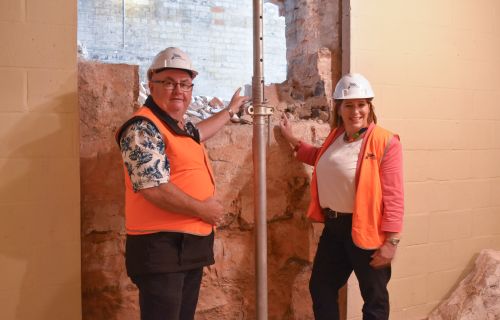
Her Majesty’s Theatre will be safer and more accessible for theatre goers of all abilities, as restoration works commence at the Ballarat icon.
On Wednesday, Member for Wendouree Julianna Addison represented Minister for Regional Development Harriet Shing alongside City of Ballarat Mayor, Cr Des Hudson to mark the start of Stage 3 upgrades.
The project is supported by $10,000,000 from the State Government’s Regional Jobs and Infrastructure Fund and $4,799,533 from the City of Ballarat.
The works to ensure modern compliance standards include installing two new passenger lifts (front and back of house), accessibility improvements, improved fire safety as well as a new box office and bar.
Works are expected to take about 17 months to complete.
Cr Hudson said it was an exciting milestone in Her Majesty's Theatre’s long and prestigious history.
“We are delighted to see Stage 3 works for our beloved Her Majesty’s Theatre now underway,” he said.
“These critical improvements will bring the 147-year-old venue up to modern accessibility standards and ensure future generations will continue to enjoy this icon of Ballarat.”
Member for Wendouree, Juliana Addison said the restoration was in good hands with local firm Nicholson’s Constructions completing the upgrades.
“Her Majesty’s Theatre showcases some of our finest artistic talents and is beloved by locals– I’m delighted its future is being secured, while boosting jobs at the same time,” she said.
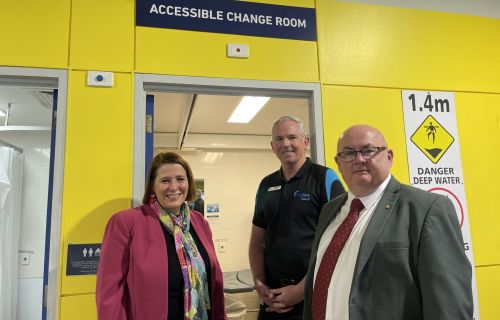
The Ballarat Aquatic and Lifestyle Centre (BALC) is about to become even more accessible and inclusive thanks to a joint project between the State Government and City of Ballarat.
City of Ballarat Mayor, Cr Des Hudson was joined at the centre on Tuesday by Member for Wendouree, Juliana Addison MP to announce the $997,000 accessibility upgrade.
The project will see a number of improvements led by the addition of two Changing Places facilities, along with two other accessible and sensory friendly family change rooms at BALC.
Doors will also be upgraded to automatic sliding doors for other accessible change rooms, group fitness studios and the health club, as well as an automatic swing door on the ramp to the café.
Installation of automatic entry gates to replace existing turnstiles will complete the project, which is made possible with a $748,000 grant from Sport and Recreation Victoria’s Regional Community Sports Infrastructure Fund and $249,000 from the City of Ballarat.
Ballarat Mayor, Cr Des Hudson said this project was about providing easy access to the Ballarat Aquatic and Lifestyle Centre for the whole community.
“Ballarat is an inclusive city where diversity is not only accepted but welcomed and celebrated,” he said.
“Figures show about one in six people live with disability. There are around 19,000 people with disability in Ballarat and more than 6,000 people with severe or profound disability live in our municipality.
“The City of Ballarat proudly strives to ensure everyone can participate in everyday activities and these significant upgrades at the Ballarat Aquatic and Lifestyle Centre will go a long way towards meeting our commitments.
“I’d like to thank the State Government for their support of this important project.”
Member for Wendouree, Juliana Addison said the funding would enhance accessibility at the Ballarat Aquatic and Lifestyle Centre.
“Changing Places facilities enable community members with high support needs to access facilities and remove barriers to their participation. This funding is all about inclusivity and puts out the welcome mat for everyone to enjoy access to the pools at the Aquatic Centre,” she said.
“Funding for two Changing Places facilities at the BALC will make it easier and convenient for people with disabilities to enjoy the benefits of hydrotherapy and swimming”.
Aquatic and Leisure Services manager Gerald Dixon said the announcement of successful funding for the project was a terrific result for the entire community.
“In early 2021, I asked the Ballarat City Council’s Disability Advisory Committee what their experiences at the aquatic centre were like,” he said.
“Their brutal honesty and ongoing feedback on design concepts directly led to this successful bid and a transformation in the way Ballarat Aquatic and Lifestyle Centre approaches accessibility.”
The BALC Changing Places upgrade project is another example of the City of Ballarat’s commitment to delivering a better Ballarat.


